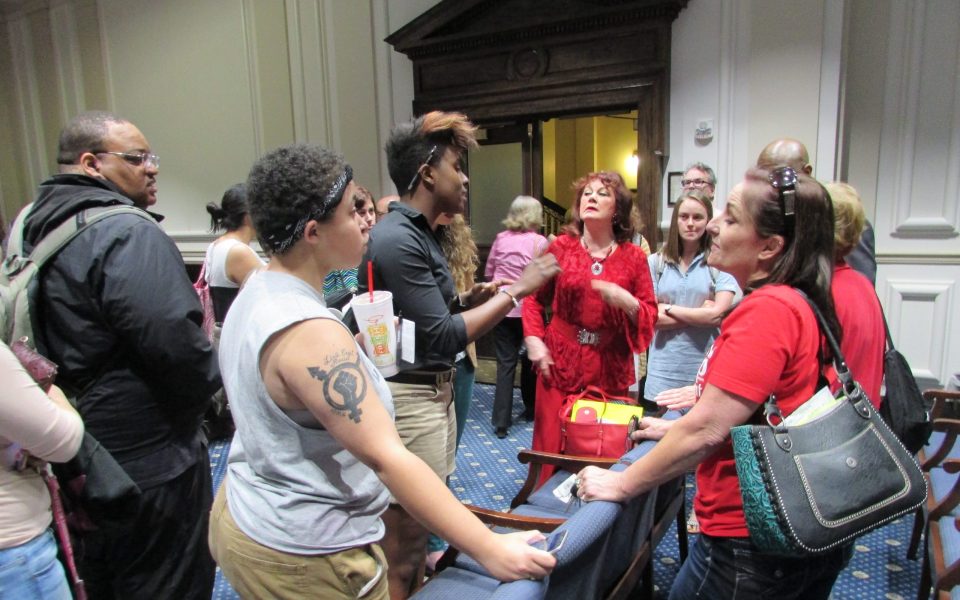Winston-Salem’s proposed “welcoming city” resolution brings out heated emotions on both sides even as city council puts it on hold to confer with state lawmakers.
Councilman Dan Besse, the author of a resolution declaring Winston-Salem to be a “welcoming city,” agreed to pull the item on Monday night, following a request from a Republican member of the Forsyth County delegation to discuss the proposal at an upcoming legislative town hall on Wednesday.
Besse downplayed the disruption to the planned vote, characterizing Rep. Donny Lambeth’s request to Mayor Allen Joines as “courteous” and “quite reasonable.”
“I look forward to reassuring the state representatives in our delegation regarding the content of the resolution,” Besse said after the city council meeting on Monday. “Surely our legislators are not interested in suppressing free speech, and are purely interested in ensuring that we’re in the bounds of the law, and I can assure them that we are.”
Even though the vote was delayed, supporters and opponents of the resolution came ready with impassioned arguments, with some forced into an overflow room when the council chamber filled. Joines gave them a little more than 30 minutes together to speak from the floor, warning that there would not be another public hearing before the rescheduled April 17 vote.
The rhetoric became heated at times, with speakers raising their voices with emotion, while audience members loudly applauded in defiance of the council’s rules of decorum and occasionally spoke over each other. Public speakers split evenly in support and in opposition to the resolution, but among the opponents those who live in outlying towns like Advance, Lewisville and Walkertown outnumbered Winston-Salem residents 2 to 1.
“I actually believe that voting Winston-Salem as a ‘welcoming city’ or a ‘sanctuary city’ is a coup against the citizens of our city and our state,” said Joann Landry of Advance. “I welcome any immigrant who comes here legally, as did my mother. But if you’re allowing illegals, which is, by definition, unlawful, which is already breaking a law by being here, and you are saying to these criminals, ‘Welcome to continue to break our laws, take our services and our money to benefit your life at the expense of ours and the number of homeless veterans that was just testified to beforehand,’ then you should be willing to benefit the citizens, not the undocumented, unknown and the illegal aliens at the expense of the taxpayers.”
Landry went on to warn that under the orders of Attorney General Jeff Sessions, Winston-Salem would lose federal grants if city council defies the federal government. The proposed “welcoming city” resolution does not include the word “sanctuary,” and was carefully written to avoid violating either state law or President Trump’s executive order on public safety in the interior. A 2015 state law passed by the General Assembly and Trump’s executive order both seek to prevent local governments from ordering law enforcement to not cooperate with federal immigration authorities.
“If Winston-Salem goes bankrupt, all of the outside communities are going to be taxed higher to pay for the lack of funds in order to get the things that are done for our structure of the city funded,” Landry added.
Opponents also made arguments against the resolution based on unfounded claims about “epidemic” levels of crime by undocumented immigrants.
Will Cox, a member of the Winston-Salem Sanctuary City Coalition, defended the “welcoming city” resolution, while arguing that it needs to go further.
“If you look at [the resolution], it’s absurd even the idea that you need to go to our legislature,” he said. “If you can make that illegal, then if you smile at somebody, if you shake somebody’s hand, if you help somebody that needs help, you’ve committed a crime. And that’s not right. You all know that’s not right. Nobody needs political cover right now. Because we know what’s going on.
“Immigrants are the least likely to commit crimes,” he added. “What did go up in 2016 is hate crimes.”
Join the First Amendment Society, a membership that goes directly to funding TCB‘s newsroom.
We believe that reporting can save the world.
The TCB First Amendment Society recognizes the vital role of a free, unfettered press with a bundling of local experiences designed to build community, and unique engagements with our newsroom that will help you understand, and shape, local journalism’s critical role in uplifting the people in our cities.
All revenue goes directly into the newsroom as reporters’ salaries and freelance commissions.


You suck, Bessie.